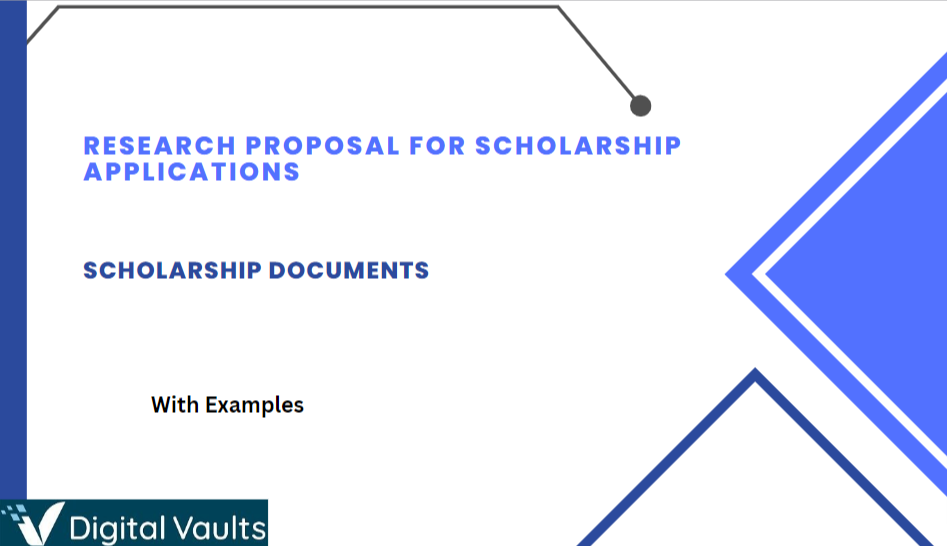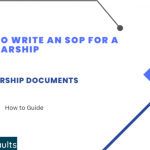How to Write Research Proposal For Scholarship Applications? With ExamplesSeptember 22, 2023 by Digital Vaults Editorial Team
If you’re lucky enough to have the chance to apply for a scholarship, it’s essential to consider that you will likely need to write a study proposal. While this can feel daunting, it’s not that difficult, so long as you know where to start and what you hope to achieve!
Why is a Research Proposal for a Scholarship Important?
Before we go any further, it’s worth considering why you’re putting effort into the study proposal. Indeed, knowing the value or weighting of a task often makes it much easier to stick to!
So, what’s the importance of a research proposal? A good research proposal demonstrates why your project and approach would fit the requirements well.
Invariably, an organization costs much money to provide a funded scholarship. As such, your study proposal allows you to demonstrate the value you’ll bring to the business. In other words, it’s a way of showing the scholarship provider that you are a valuable asset to their work.
As such, your study proposal drastically boosts the strength and appeal of your scholarship application. Remember: going for a scholarship is hugely competitive. As a result, making your application stand out is essential. This is where your study proposal can help.
So, don’t leave things to chance if you want to boost your study proposal.

Key Things to Include In Your Study Proposal Scholarship
By now, we’ve looked at what a study proposal is and why it is essential for your application. But what are some critical things you should include in your study proposal?
Generally, the key things you will need to include in your study proposal include the following points.
#1 Introductory Information
The most obvious thing your study proposal should include is introductory information. Indeed, introductory information (e.g., the title of your research proposal, the primary goals you’re hoping to achieve, etc.) is critical. This shows the reviewer of the study proposal how the research might relate to the company’s goals.
#2 Your Background
You need more than just the topics you intend to study for your scholarship. In your study proposal, you should also cover why you’re a good fit for the role – in other words, what is your background? What is your understanding of the topic, and how does this relate to your proposed topic? Considering this will directly influence your application, demonstrating that you are qualified and knowledgeable to approach the subject.
#3 Key Questions
As well as introducing the topic, it’s vital to ensure that your study proposal addresses any key questions relating to your topic. In other words, what problems are you addressing? How will looking at these issues help solve and improve social or economic aspects?
#4 Time Frames
As well as answering the critical questions of your study, your study proposal should indicate expected timelines and deadlines for the work. This helps ensure that the research proposal reviewer can see when you’ll aim to deliver the work and whether this comfortably meets the timeframe for the scholarship.
When planning your time frames, it’s essential to consider that a full-time study offer will usually have a four-year timeline to completion. This includes writing up your research in the third year. Meanwhile, for part-time study, you will likely have around six years to study and two more years to write up your results.
Make sure your proposed time frames fit into this comfortably. This ensures you’ve demonstrated that you will be a good candidate for the scholarship. After all, why would a business want to accept a scholarship applicant who couldn’t complete the study on time?
Steps to Write a Study Proposal Scholarship
At this point, we have outlined some of the main things you need to know about what is included in a study proposal. However, that doesn’t directly help with writing the scholarship. The following outline should help create an effective, reliable, and valuable study proposal.
Make a Summary of Key Points
Before you begin writing your scholarship study proposal, summarize the key points we mentioned before. These key points need to be included in your study proposal. Outlining them is very important to ensure a clear focus on how the study proposal should look.
Start with your Cover Page
A cover page is a surprisingly important part of your research proposal. Indeed, the cover page provides a simple introduction to the proposal, shows that you can work professionally, and shows an additional level of determination above the bare minimum. Remember: the institution will use your study proposal to assess whether you’re a responsible, hard-working fit for the scholarship.
Create an Introduction
Don’t try to jump immediately into the body of the study proposal. Take things one step at a time by starting with the introduction.
Your introduction needs to cover all of the basics of your study research. As such, it should outline the main points, such as the title of your project and the main research problem. However, it should also briefly hint at your experience and inspiration for the project. However, be brief here, as this will be addressed further in the later sections.
It’s essential to ensure the introduction also covers your main research objectives. Failing to express these could result in your application holding less merit and strength than others.
As a key tip: keep the title of your research proposal simple. Your chosen title should be simultaneously informative and straightforward to understand. This will help the reader understand quickly the exact niche you will focus on and how this could benefit the institution’s goals.
Complete a Literature Review
Once you’ve outlined the main points behind your research proposal and introduced the concept, you can begin your literature review.
A literature review offers a straightforward yet highly effective way to show the current understanding surrounding the topic. With this thought in mind, try to go relatively in-depth with your analysis here. Of course, this only requires a partial analysis of the topic. You don’t have an unlimited word count to work with (yet), and you’ll want to leave some of that for the main body of your research!
However, presenting a thorough, well-researched overview of the available literature should be enough. Try to find research from within your country and internationally to present diverse viewpoints. You don’t need to expand on these, but summarize the key findings of each of the addressed studies. You could also mention their strengths and weaknesses.
Once you have done so, completing the literature review becomes very easy! The literature review should highlight any well-established knowledge. It should also highlight where knowledge is lacking or missing and how this relates to what you will address in your research.
Present the Research Methodology
Once you have determined what you intend to research and how this relates to the literature review, you can outline your methodology. Summarizing the key things you intend to address makes this much more accessible.
While you won’t necessarily need to present every little detail, your research methodology should be thorough enough to cover all the main points. Try to dedicate half a page to a full page on this section. Make sure you also mention the strengths and weaknesses of your methodology. Be sure also to explain why you can’t address the weaknesses directly.
In the methodology section, adding a timeline can be incredibly helpful. This will demonstrate how you intend to complete the research.
It also shows when you will complete each section and so on. In addition, dividing your work into stages can make it easier to stick to the schedule if you achieve the scholarship. So, this is well worth paying attention to.
Don’t be overly ambitious; set realistic deadlines you can meet rather than speedy deadlines you’ll struggle to keep up with. Missing deadlines look terrible on your research and can be disheartening. This will make a vicious cycle where you only get more and more behind.
Outline Funding Requirements
Unfortunately, conducting thorough research isn’t free! With this thought in mind, you’ll need to outline funding requirements for the research. In other words, how much will you need for the scholarship?
Be sure to calculate this section very carefully. If you ask for less funding, the scholarship institution will likely look for someone else who can do the work more affordably. However, you may need to ask for more to make ends meet. Indeed, getting more funding can often be very hard once a price has been agreed upon for the scholarship. So, the importance of calculating this carefully is vital.
Bibliography
Throughout your research proposal, including a diverse range of references can back up your application and show how much work you’ve done towards it. However, it’s essential to remember that you’ll need to include a bibliography at the end of your research to give full credit to any authors you’ve referenced.
Be sure to check which referencing style your institution expects before getting started. If your institution expects a specific referencing style to be used, now’s the perfect time to demonstrate your skills and how you could bring value to the project.
How Long Should my Research Proposal Be?
You may now be wondering how long your research proposal should be. Well, this entirely depends on how you write, how much you must cover in the proposal, etc. However, your research proposal should be between 2500 and 3500 words.
As such, a specific aim for your research paper will be around five to seven pages. However, this final figure will depend on how you write and the font or formatting you choose.
If you still need to hit the 2500 words mark, take the opportunity to expand your proposal further. Remember, a lot is riding on this! But, you should be good if your research paper is already at 2500 words or more.
If you go over 3500 words, remember that the reader may begin to lose interest. Condensing an excessively long study proposal can make it much easier for the reader to take in.
Final Thoughts
If you have been wondering about how to write a study proposal for a scholarship, there are several vital things in this regard that you should consider. Fortunately, there are numerous ways you can boost your results by writing a study proposal for a scholarship. Today’s essential tips may have helped here.
After all, while no simple solution will immediately create the perfect study proposal for your scholarship, you can take many excellent steps. These help you find suitable options to boost your application.
Good luck – but with an excellent study proposal, you won’t need it so much anyway!
You can find full list of documents required for scholarship here.


